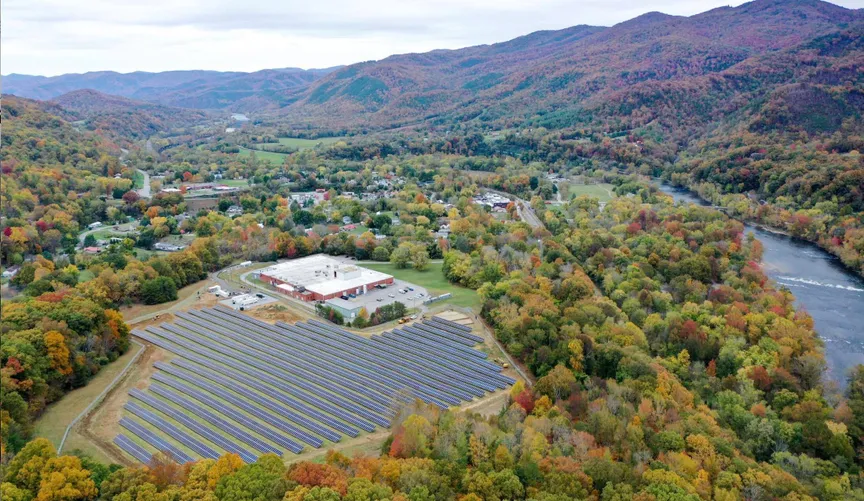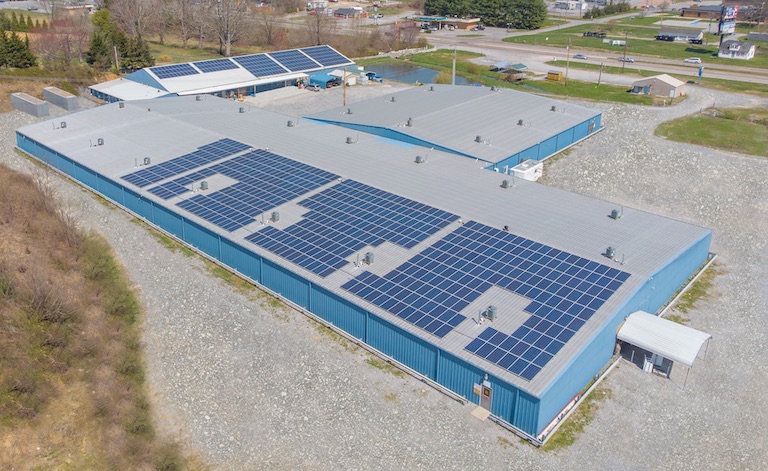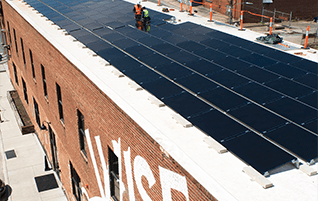by Renu Energy | Feb 4, 2025 | Residential
The Rising Cost of Power
In 2020, the average homeowner’s power bill was around $100 – but today, that cost has more than doubled with the average homeowner now paying over $200. Several factors contribute to this rise, including the increasing costs of maintaining the grid and the volatility of energy prices. Utility companies continue to pass these rising costs onto consumers, leaving homeowners with little control over their monthly bills. Without solar, you’re essentially renting your power from the grid, paying a monthly fee just to access electricity. However, when you choose solar, you take control of your energy. By generating your own power through solar panels, you can reduce or even eliminate your reliance on the utility company, protecting yourself from future rate hikes.
What’s even better? By adding a battery to your system, you can eliminate your dependence on the grid entirely. With solar + battery storage, you not only create your own energy but also store backup power for emergencies. This means that when the grid goes down due to storms, power outages, or unexpected failures, your home stays powered, keeping your lights on and your appliances running. Energy independence is more than just a convenience—it’s peace of mind, ensuring that you and your family have reliable electricity when you need it most.
The Financial Benefits of Switching to Solar
Switching to solar isn’t just about personal benefits—it’s also a smart financial decision. When you install solar, you gain access to a 30% federal tax credit, lowering your taxable income. Many states and utility companies also offer additional incentives, making solar even more affordable. Over time, your solar investment pays for itself through lower energy bills, increased home value, and long-term savings. Instead of throwing money away on ever-increasing electric bills, why not put that money toward something you own?
Solar Power and a Sustainable Future
Beyond financial savings, solar power contributes to a cleaner, more sustainable future. By reducing reliance on fossil fuels, you help lower carbon emissions and decrease the overall demand for energy produced by traditional power plants. Many homeowners who go solar are not just thinking about their own energy needs but are also helping to strengthen the grid and support a more resilient energy infrastructure. When more homes generate their own power, the strain on the grid decreases, benefiting the entire community.
So, why keep renting your power when you can generate, store and own your energy? Making the switch to solar is an investment in your home, your finances and a more sustainable future. Take control of your energy and start saving today!

by Renu Energy | Oct 18, 2024 | Uncategorized
By Jeff St. John | 18 October 2024
Distributed solar and batteries are helping North Carolina communities that were cut off from grid power by flooding. Should utilities build them into resilience plans?
For years, Duke Energy has studied the threats that climate change poses to its power grid. It has produced tomes forecasting the risk to its power lines, substations, and power plants from fires, heat waves, and floods.
But the scope of Hurricane Helene’s devastation in the utility’s inland Carolinas territories — more than 350 substations disabled and a handful completely destroyed, and hundreds of thousands of people still without power a week after the floodwaters receded — has blown its risk forecasts out of the water.
Now, as tens of thousands of utility workers from across the country struggle to rebuild swaths of Duke’s grid from the ground up, energy experts warn that it and other utilities must start to consider alternatives to the century-old paradigm of utility poles, wires, and substations — like distributed power and microgrids.
Solar panels and batteries can power homes, businesses, churches, schools, and sometimes entire towns. These clean, distributed energy systems can reduce or replace the need for fossil-fueled backup generators during emergencies. They can also provide clean energy to the grid under normal conditions, helping to lower reliance on the fossil-fueled power plants responsible for climate change.
In parts of western North Carolina and South Carolina where floods swamped towns and knocked out highways, these technologies may be more cost-effective investments in climate resiliency than trying to harden traditional grid infrastructure against extreme weather.
Just how valuable distributed energy could be as an additional layer of protection against these threats is not yet clear, however. That’s largely because utilities and regulators haven’t fully baked those options into their existing methods of assessing climate change risks to their grids.
“It’s always hard right after these storms to talk about next steps, because all energy and time has to be spent on the emergency response,” said Jenny Brennan, a climate analyst at the nonprofit Southern Environmental Law Center. At the same time, it’s important to think ahead about “how to build for the next time a storm comes, so you’re more resilient as a community, and hopefully don’t have the same scale of destruction.”
In 2021 and 2022, Brennan was a member of a technical working group advising Duke on a climate resilience and adaptation study. That multiyear project assessed climate risks to a grid serving a roughly 56,000-square-mile service area in North Carolina and South Carolina. But that grid-focused report also touched on the idea of “supporting and encouraging local power options” such as microgrids, rooftop solar, and community solar.
Those distributed energy resources may be particularly well-suited for the mountainous, harder-to-reach parts of Duke Energy’s territory, Brennan said. “We’ve got to consider these different needs, and design an infrastructure that can be adaptive and address these problems.”
The utility-centric option: advanced microgrids
The more remote the town, the costlier it is to connect it to the grid — and to ensure that the connection remains intact. That’s why Duke Energy created a microgrid in Hot Springs, a town of about 535 residents just under 40 miles northwest of Asheville.
That project wasn’t cheap — Duke spent about $14.5 million to install 2 megawatts of solar power and 4.4 megawatt-hours of battery storage along with technology to control it as a grid resource. But according to the utility, that was cheaper than the grid upgrade required to provide the town with reliable power.
Hot Springs is connected to Duke’s larger grid by a single 10-mile power line that crosses mountainous and wooded terrain. The line is subject to frequent outages. Duke easily won regulatory approval in 2019 to build the cheaper microgrid instead of a second power line as a backup.
During Hurricane Helene’s aftermath, the microgrid was quickly restored and started providing power to Hot Springs’ downtown area after “the substation that fed the town was washed away by the floods,” Jason Handley, general manager of Duke’s Distributed Energy Group, wrote in a LinkedIn post. “Depending on solar output, we’ve also been able to bring on other load segments for periods of time.”
Duke is planning more microgrids at the Marine Corps Base Camp Lejeune in North Carolina and at a middle school that serves as a hurricane evacuation shelter in Florida. But at present, microgrids — or what Duke Energy calls “non-traditional solutions” — play only a minor role in the utility’s broader grid plans.
That’s largely because they are deemed cost-effective only for the most remote and vulnerable communities on its grid.
“If an energy storage system is the most cost-effective, feasible approach, Duke Energy will then pursue further development of the project,” the utility wrote in its climate resilience plan. Once such projects are identified, “the development cycle for these efforts is typically on the order of seven years.”
The basics for customers: rooftop solar and batteries
Tyler Norris, a Duke University doctoral fellow and former solar developer and special adviser at the Department of Energy, thinks that utilities like Duke Energy should look at more options than utility-managed microgrids.
“There needs to be an entire report dedicated to the role of distributed energy resources on a medium- and long-term solution set,” he said — including the kind of distributed energy that could have helped his elderly parents, whose home in Fairview, North Carolina, was without power for more than nine days after Hurricane Helene.
Norris spent a week with his parents, helping them manage without power or running water. “They have their own spring, but because we didn’t have power for the water pump, you have to haul water up the mountainside by hand,” he said. “I was trying to use a gas generator to charge our electric vehicle, which required jury-rigging it to the house ground.”
Rooftop solar systems can provide enough power to run a handful of household necessities — like a water pump — during daytime hours, he said. But most residential systems aren’t designed to keep power flowing during grid outages. Typically, these systems shut off when the grid goes down, a safety feature meant to prevent power from the solar panels from flowing back through downed utility lines and electrocuting utility workers doing repairs.
“It’s shocking how many of these existing behind-the-meter solar systems were not designed to provide any form of backup power,” Norris said. Some more recently installed systems are designed to disconnect from the grid and stay on during outages, but that’s far from universal. “I suspect that’s going to be an area of focus going forward.”
Some new high-end residential developments like Babcock Ranch and Hunters Point in Florida have been built with solar power and batteries designed to function during broader grid outages. But such microgrid-enabled communities are few and far between in the U.S., and the cost of solar and batteries remains out of reach for many households.
Meanwhile, utilities aren’t incentivized to promote solar and batteries for their customers, since their proliferation could erode utility revenues. Like most investor-owned utilities, Duke Energy has pushed to reduce the value of rooftop solar for customers, saying that it unfairly shifts costs from homes that can afford solar onto its broader customer base.
While the utility has promoted an alternative program that rewards customers for installing batteries that can shift residential solar power to times when it’s more valuable to the grid at large, that program is in its early stages, and rooftop solar advocates say it’s insufficient.
“Unless there’s a major change in incentives — which may require legislation — this will have to be driven from the ground up by local governments and community organizations,” Norris said.
Community resilience hubs: power for neighbors to help neighbors
That’s the route Michelle Moore, CEO of Washington, D.C.–based nonprofit Groundswell, is pushing for at community resilience centers in the Southeast. Her group has helped finance solar and battery projects for churches and community centers that already provide shelter and food for people in need.
One of those projects at the Vicars Community Center at the Community Church Atlanta rode through Hurricane Helene without losing power. But if it had, “there’s enough battery storage to keep critical systems going for three days, even if it can’t be recharged by solar,” she said. “If the sun shines, it can go on and on.”

by Jeff Aliotta | Oct 8, 2018 | Energy Storage, Renu Solar News
Mark Phillips has installed a rooftop electric system at home and greened his warehouse

future home of solar panels at the warehouse
OCTOBER 8, 2018 – HIGH POINT, NC – The signature wood and stone furnishings and sculptures from Phillips Collection stand out in any room. Owner Mark Phillips has recently received attention for a different distinction: He’s completed major energy efficiency retrofits to his 166,000-square-foot headquarters of the furniture wholesale business to demonstrate environmental responsibility. At an electric cooperative conference in Asheville where he was invited to speak, he explained the many energy-saving changes they’ve made, including:
-
Removing all halogen bulbs from track lighting and replacing with articulated LED fixtures newly invented for this purpose that make use of existing track (in collaboration with ERD of Kernersville) eliminating the need for expensive rewiring, and reducing cooling needs and lighting cost. They even acquired a specialized bulb disposal machine for the job.
-
Right-sized the incoming power transformers with help from ElectriCITIES, modifying the facility’s demand
-
Put in 3 electric vehicle charging spaces outside offering free power for customers who can plug in
-
Implementing a solar installation for the business
Furniture wholesale and design has long been a part of High Point’s culture and Mark’s company specializes in designing organic pieces that embrace natural materials. From mango and acacia tree roots to reclaimed teak, Phillips Collection sources sustainable materials and transforms them into prized conversation pieces. Mark acknowledges that his business depends largely on natural ecology and travels to Thailand to ensure that the next generation of arborists and carpenters are ready to continue a steady relationship with him and his team. On a recent visit he rallied a group of 400 — comprised of local students, teachers, factory workers, villagers and local officials — and together they planted 6,000 trees in a single day.

using less power, storing and showcasing the same great furniture designs
Phillips went solar at his home this month, and the business installation is scheduled for October. Renu Energy Solutions is providing both the residential and commercial installations. Combined they add up to 45 kiloWatts in total size, estimated to produce over 63,000 kiloWatt hours of solar power in its first year.
About his choice to go solar, he says: “My father always said the big decisions in life are obvious. This was one of those.” For Mark, addressing energy sustainability expresses his values, and at the same time he notes that he’s likely to come out ahead by betting that the cost of electricity isn’t going down. He says he committed to energy efficiency and solar at his business and home to save money and because, “it’s the right thing to do.”
Phillips Collection Owner Mark Phillips will be available to talk about his experience pursuing energy efficiency and green standards before and during this upcoming event.
Meet Mark Phillips during Phillips Collection’s Showroom Party (IHFC C-202) High Point Market
210 East Commerce Ave, 2nd Floor C-202, High Point, NC 27260
Saturday, October 13, 2018 beginning at 3 pm – event will be underway at 4 pm
by Jeff Aliotta | Oct 10, 2017 | Renu Solar News
Winston-Salem’s Wise Man Brewing Is Going Solar
Winston-Salem, NC – October 10, 2017 – A local Winston-Salem brewery is announcing something no other production brewery in the Triad has up to now: Wise Man Brewing plans to harness the power of the sun!
Wise Man Brewing has quickly gained recognition since opening in January 2017 in the historic Angelo Brothers building located in downtown Winston-Salem. Their planned 34-kW solar system will offset a majority of the brewery’s future power bills. This new development is energizing brewery staff and garnering tremendously positive feedback from taproom customers.
This is a big step for an antique building: the 90-year old Angelo Brothers structure had been sitting vacant for about a decade and was in dire need of repair. Remodeling for the brewery began in 2015, and Wise Man was able to open its doors two years later. With the remodel of the historic building came an opportunity to make efficiency upgrades to the building such as a new roof, insulation, LED lights, high-efficiency water taps for brewing, and now finally solar energy.
Wise Man’s owners expect to see the electric usage decline even while beer production increases. On the timing of the decision, Wise Man Brewing Co-Founder Jason Morehead says, “We have always had a focus on sustainability, but getting a brewery off the ground is a monumental task. Now that we’re up and running, we’ve been able to take a step back and focus more on our footprint. Anyone who has been to our taproom knows that community is core to Wise Man’s culture. Being an environmentally friendly brewery is central to being a good neighbor and responsible business.”
“Speaking as both a lover of craft beer and as a supporter of renewable energy, I’m thrilled that Wise Man Brewing is moving ahead with solar,” said Patrick Cavanaugh of Renu Energy Solutions. “I love a good craft beer in a historic setting, and now the building will feature clean energy, too. The Renu Energy team is pleased to be a part of this project, and it wouldn’t surprise me if more breweries opt to start using solar to reduce monthly power costs while making a statement about taking care of the planet.”
Within the past 15 years, Winston-Salem has transformed itself from a textile and tobacco economy to be a leader in the nanotech, high-tech and biotech fields. Medical research, banking, and a flourishing arts community have come to give Winston-Salem its character in recent years. Wise Man Brewing along with others breweries is making a mark on the craft brew scene in North Carolina, in quality and in social benefits.
Renu Energy Solutions has provided solar energy systems for home and business since 2010 and is proud to partner with Wise Man Brewing as they join the renewable energy revolution. No-cost consultations for solar are available for qualified homeowners and commercial customers.






